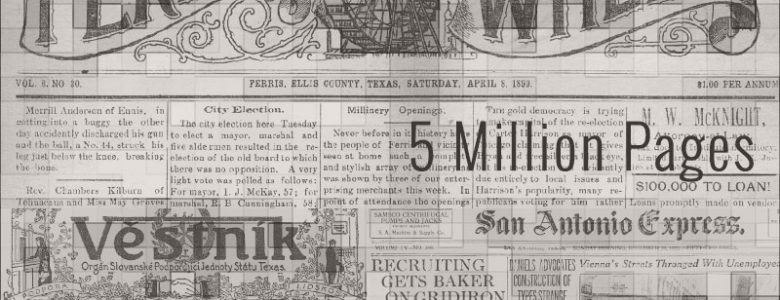|

On February 15, 2017, the Texas Digital Newspaper Program reached five million pages of Texas newspapers. This collection spans from 1829 up to the present, and this work has involved partnerships between University of North Texas Libraries (UNT) and almost 130 partners, including local public libraries, academic libraries, genealogical and historical societies, granting agencies, and in some cases, personal contributors.
Through this digital preservation effort, the role of TDNP in community preservation of newspaper history has grown to reach all corners of Texas, as well as to branch into newspaper preservation for diverse communities, with such titles as El Regidor, The Jewish Post, The Jewish Herald, The Southwest Chinese Journal, Svoboda, Vestnik, and The San Antonio Express.
Fun Facts
TDNP began with the Ferris Wheel collection in 2005. As the digital newspaper collection crosses the 5 million page line, I’m excited to offer a few interesting facts and figures to illustrate the program.
| Oldest Issue | September 25, 1829 | Texas Gazette |
| Westernmost Title | El Paso Morning Times* | We also have the El Paso Herald available in TDNP, but based on the historical addresses in a Google Maps search, the Times is the farthest west publication. |
| Southernmost Title | Matamoros Reveille | June 24, 1846 |
| Northernmost Title | Lipscomb Limelight | |
| Easternmost Title | Newton County News | |
| Languages | 10 | English, Chinese, Czech, French, German, Hebrew, Italian, Norwegian, Spanish, Swedish |
| Largest Contributing Partner | Abilene Library Consortium | 44,599 newspapers |
| Most Unique Name for a Newspaper | (Not the Jimplecute, although we do love that title, too.) | The Texas Mesquiter |
| Number of Partner Institutions | 128 | |
| Number of Newspaper Titles | 1102 |
TDNP also contains a handful of issues from unique titles that enhance the diversity of the collection. These include:
-
- The Old Flag, published in Camp Ford during the Civil War, was created by Union POWs who hand-wrote each issue. UNT’s Special Collections houses lithograph copies created by the original newspaper publisher, of which there are three total, published on February 17, March 1, and March 15, 1864.
- The Representative began publication in late 1872, according to the volume and issue numbers available in TDNP, and was the first newspaper owned, edited, and published by an African American man, Richard Nelson. This is contrary to what the TSHA Handbook Online states, which says that Nelson’s second title, The Galveston Spectator, was the first title. Primary source evidence shows that The Representative actually claims this distinction. Twenty-four issues of The Representative are available on the Portal.
- The Pine Needle, contributed by Lamar University, was a weekly newspaper published in Hardin County between 1964-1968 by attorney Houston Thompson and his silent partner, William Thomas Bean. This paper served as a vehicle to protest what Thompson believed was widespread political corruption in Hardin County. He also utilized the newspaper to promote the establishment of a national park in the Big Thicket, believing that this would increase tourism in the region and lessen what he believed was the economic monopoly of the large lumber companies in the area. The Pine Needle documented the opposition to a national park and the compromises which eventually led to the creation of a national preserve.
- The El Paso Morning Times was the only Texas title of its period to internationally report on the progress of the Mexican Revolution in both Spanish and English. Access to this coverage was made possible through a collaborative project with the University of Texas at El Paso and the University of Arizona.
As TDNP matures into five million pages, UNT Libraries will host a celebration to thank all of the contributors who have made this collection so expansive and successful. Exciting new projects are on the horizon, ones intended to further increase the diversity of the collection to support all Texans and to reveal to the world Texas’ well-rounded identity.
What does five million pages mean?
As a reference number to understand what this 5 million pages means, let’s look at the National Digital Newspaper Program. Funded by the National Endowment for the Humanities, Chronicling America hosts newspapers digitized through the National Digital Newspaper Program, which at this time amounts to 11,647,857 pages. These pages were digitized by 44 participating U.S. states, including Texas contributions from UNT. We are very proud to have participated in the National Digital Newspaper Program because it gave UNT and TDNP many tools for standards-based preservation.
|
|
|























